12 ‘Community grown’
Reflection on Dr Jackie Huggins' collection
Amy Thomson
When she submitted her PhD, future doctor Amy Thunig shared the following proclamation online: ‘I am not self-made, but community grown’. This sentiment resonated deeply with me. My experience in the Fryer Library made this increasingly obvious as it was evident that we are all interconnected as Aboriginal and Torres Strait Islander people.
I was overwhelmed with inspiration when I walked around and observed all the documents in the Indigenous collection. As a Mandadanji woman, PhD student, casual academic, and English teacher, I could feel the enormity of the documented journeys around me. These journeys were encapsulated in these papers and I could feel their weight – I felt humbled by their significance.
I know I am only at the beginning of my own journey. I know my own journey is only possible because of these journeys – because of those who came before me. I am not possible without my family and my Ancestors – but it is not only the hands of my Ancestors who carried me here. The Aboriginal matriarchs in my own family paved the way for my journey as did many Aboriginal women, academics, and writers who are ahead of me on the path I hope to walk.
I was in awe when I rifled through the papers in Dr Jackie Huggins’ box in the Fryer library. Her collection of materials spoke to me, not just as an Aboriginal woman but as an educator, an activist, and a writer.
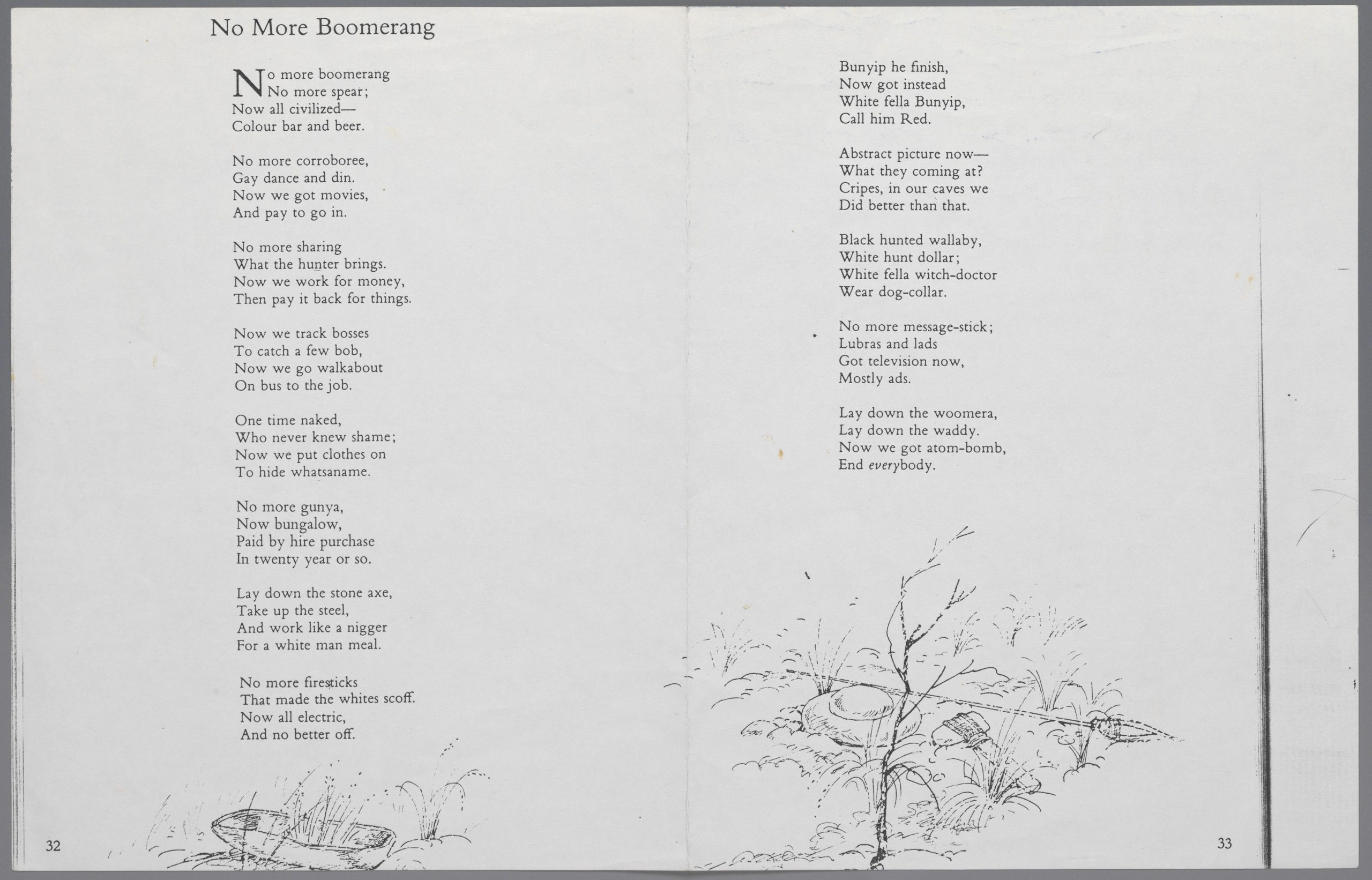
Oodgeroo Noonuccal’s poem ‘No More Boomerang’ made me reflect on all that has been lost. Those who came before us and the old ways were at the violent forefronts of the beginning of colonisation. This poem was written in 1966 – the year before the 1967 referendum where Australians voted to change the Constitution so that Aboriginal and Torres Strait Islander peoples would be counted as part of the population. And 1967 was the year my mother was born – counted as a person. The fights of our old people made our very existence possible, but it was not without immense loss so poignantly captured in Oodgeroo’s words, cherished by Dr Jackie Huggins in her collection of what inspired her own prolific writing.
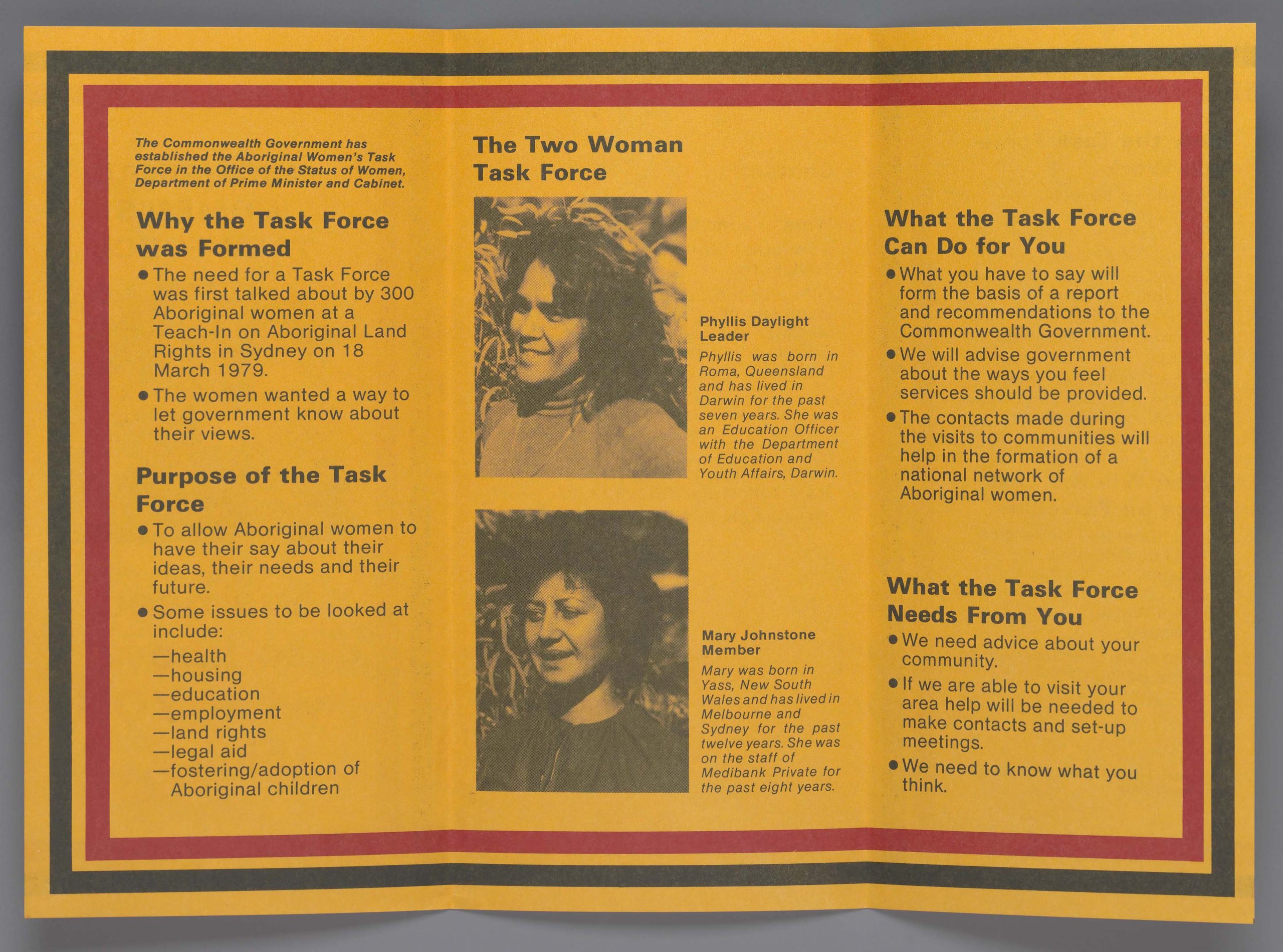
Margaret Armstrong’s poem ‘Aboriginal Women’s Spirituality’ sent shivers down my spine. It was written the year I was born, 1993. The comments about Aboriginal women’s strength ring true as we are continually fighting against the oppression still inflicted on our people. You can see this strength in Jackie’s writing – from Auntie Rita to Sister Girl. I am constantly inspired by the strength of Aboriginal women captured in this poem and all the stories that are shared in this library collection.
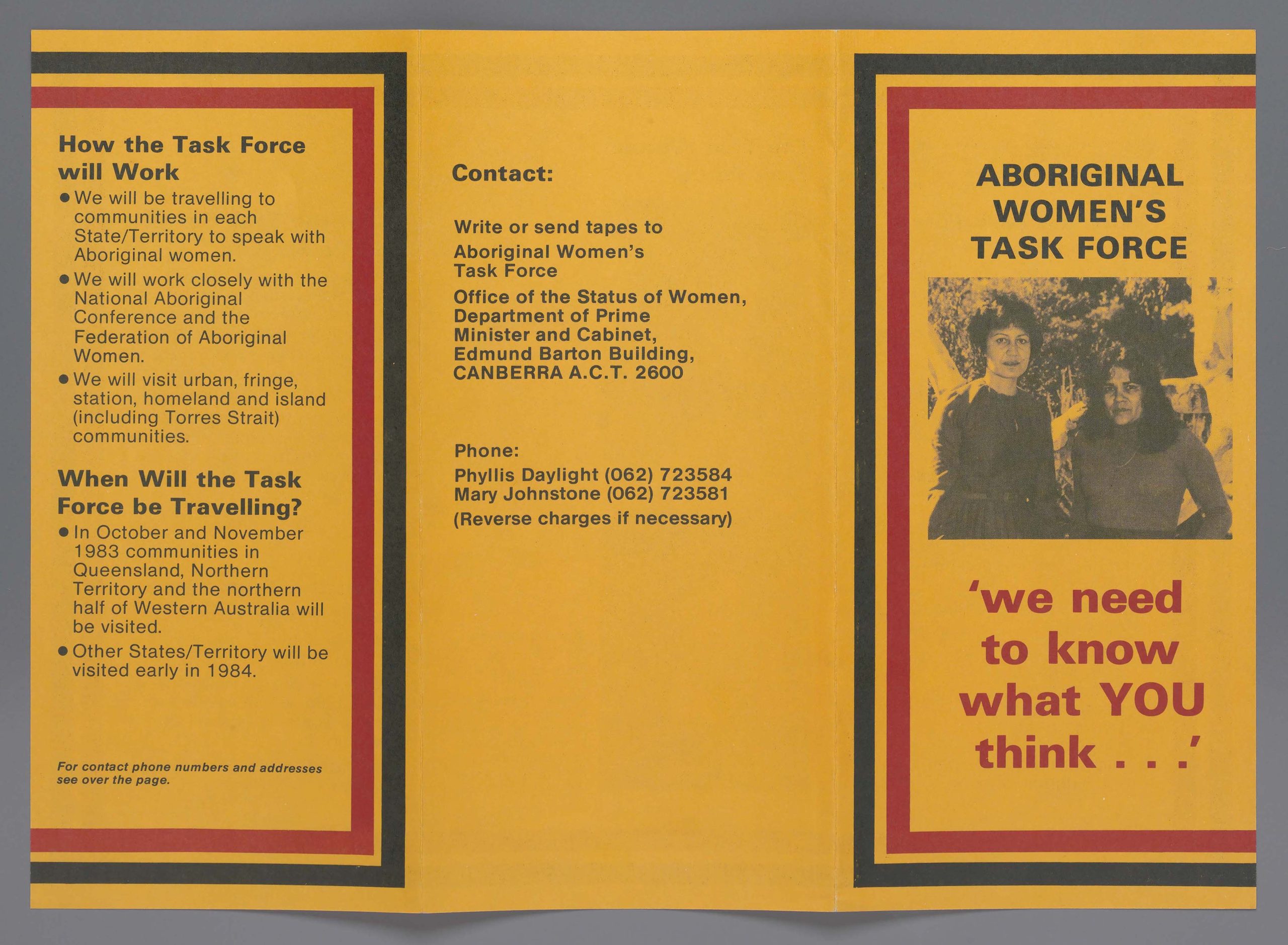
Dr Jackie Huggins’ activism permeated through the box in her collection of leaflets. Jackie’s career has been centred on social justice initiatives and when I was going through these brochures, I felt as though I was witnessing moments in time where Jackie was committing herself to the creation of a future that was equitable for Aboriginal people. The line, ‘We need to know what YOU think’ written in red on the front of the Aboriginal Women’s Task Force leaflet told her that her voice is valued, and in turn, now my voice too.
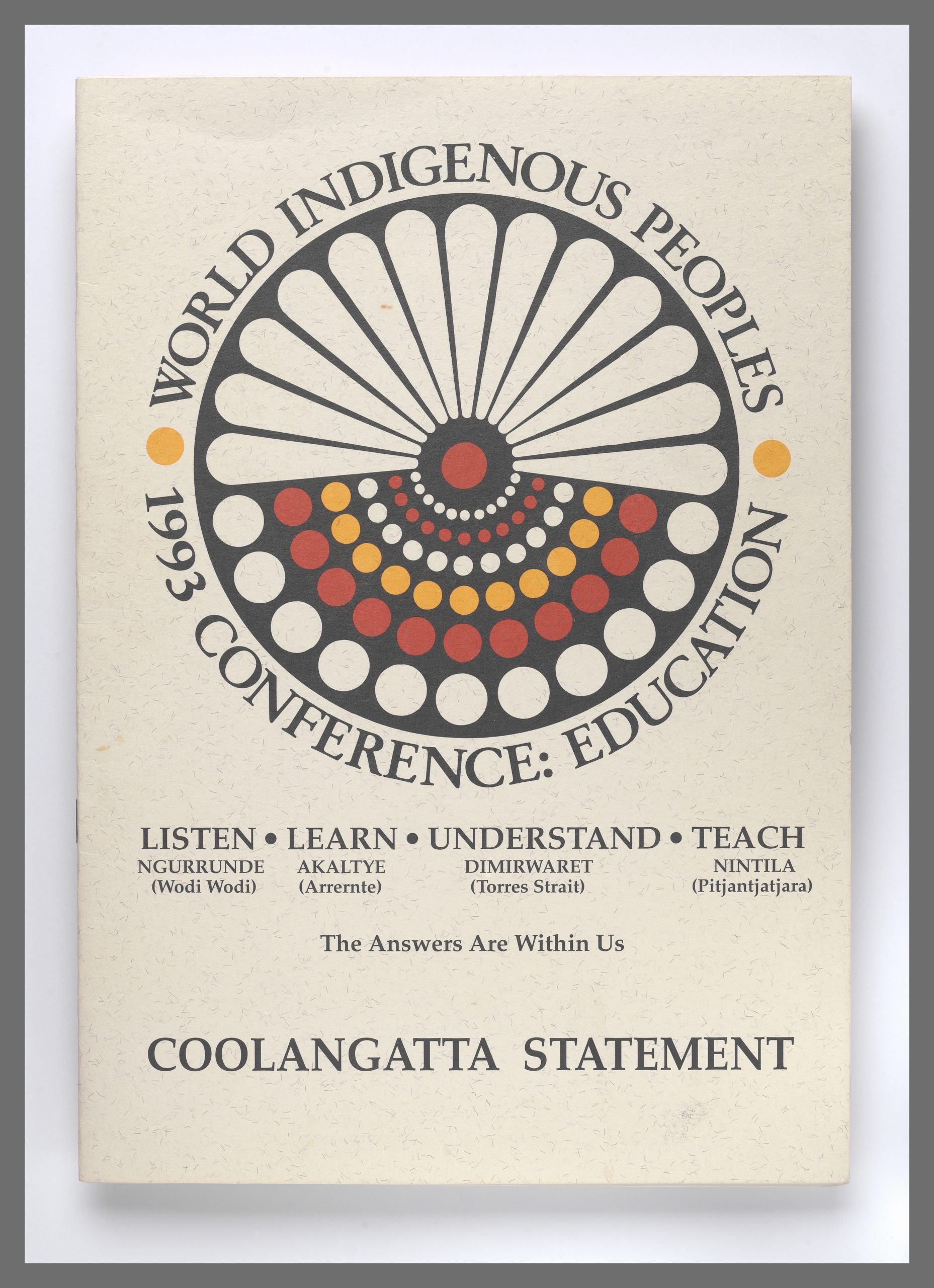
I flipped through the Coolangatta Statement from the 1993 World Indigenous peoples conference for Education.1 I read the line, ‘Indigenous People have the inalienable right to be Indigenous, which includes the right to self-determination’. I let this sink in. The right to self-determination is still being fought for now, as Jackie continues to in her career, and as I hope to now. I thanked her silently as I read the line, ‘The Answers are Within Us’. I glanced back at Margaret Armstrong’s poem and read the line, ‘Our spirit comes from within to make us strong.’ This self-determination is ours – and it is community grown – given to us from generations before us.
Dr Jackie Huggins has said, ‘It’s a very Aboriginal thing to do, to give younger people greater responsibilities within the community as they become able to take those responsibilities on. It is a culturally appropriate transfer of roles that involves respect in both directions… from the younger to the older and the older to the younger’.2
I am not self-made, but community grown.
The Aboriginal matriarchs who have walked this path before me are the only reason this path was paved – it came with loss, was built with strength, voices were heard, and the answers are within us.
And I thank Dr Jackie Huggins for being the prolific trail blazer she is and for being the reason we too now can follow her path.
References
- World Indigenous Peoples’ Conference on Education. (2024). WIPCE Coolangata Statement: The Coolangatta Statement On Indigenous Peoples’ Rights in Education. WIPCE International Council.
- AZ Quotes. (n.d.) Jackie Huggins Quotes.
* * *
Link to the Fryer Library Collection
Aboriginal Women’s Task Force, ‘We need to know what YOU think…’, 1983, Jackie Huggins Collection, UQFL468, Fryer Library, The University of Queensland.
Margaret Armstrong (Aboriginal), ‘Aboriginal Women’s Spirituality’, 1993, Jackie Huggins Collection, UQFL468, Series F, Fryer Library, The University of Queensland.
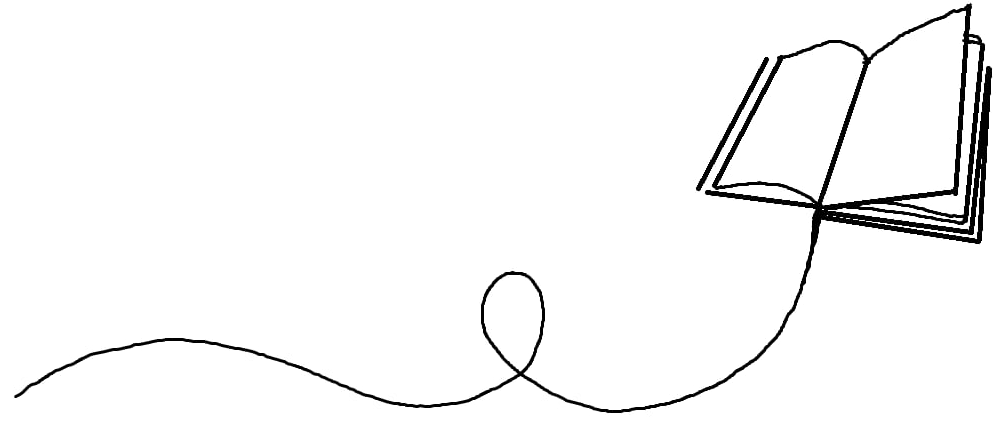
Biography
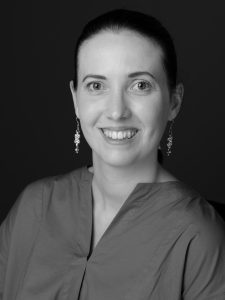
Amy Thomson is a Mandandanji woman and a current PhD student enrolled in the School of Education at the University of Queensland. Amy’s research is about how the principles of self-determination and co-design can influence the way English educators embed Aboriginal and Torres Strait Islander cultures, histories and perspectives in urban private schools. Amy currently works as a research assistant and teaches undergraduate students at UQ in both the School of Education and the Aboriginal and Torres Strait Islander Studies unit. Amy previously worked in a private secondary school in a Sydney as an English and Music teacher after finishing her Graduate Diploma of Secondary Education at UQ with a Dean’s commendation award for academic excellence. Amy’s undergraduate studies were also at UQ where she studied a Bachelor of Music (Honours) majoring in performance on French horn, and a Bachelor Arts (majoring in English literature and writing). Amy was awarded several Dean’s academic achievement awards throughout her studies and commenced her degree with a Merit scholarship after receiving Dux of her school. Amy is a mother and wife and is passionate about her family, love of teaching, research, Indigenous education, and English literature.

